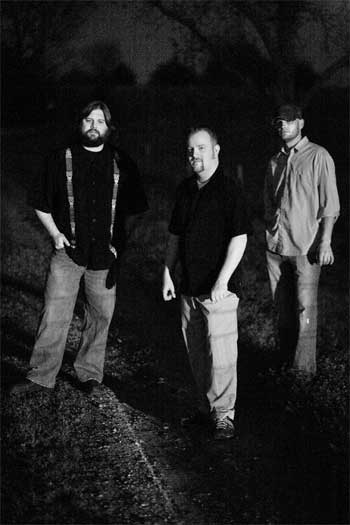A Hill Country Rumbling
By David McGee
(from left) Dustin Arbuckle, Aaron Moreland & Brad Horner
1861
Moreland & Arbuckle
NorthernBluesA word of caution to anyone approaching Moreland & Arbuckle's 1861: if you're standing, brace yourself; if you're sitting, strap in. 1861 is one of the fiercest blues assaults leveled on mortal man in many a year. Moreland & Arbuckle are actually a trio (rounded out by drummer Brad Horner) that calls Kansas home, 1861 marking the state's entry into the union. A common misconception is that Kansas is flat, but in fact it has its own hill country, as surely as does Mississippi, and M&A happen to be the finest blues trio to emerge on the scene since the North Mississippi All-Stars came charging out of the Coldwater hill country in the '90s.
Geography is not all M&A share with the All-Stars, either; add in an abiding dedication to the deep blues and a commitment to mating instrumental virtuosity with the soulful expression of a lived-in human voice. One big difference between the two is that at this early stage of their career, M&A are far better songwriters than were Cody and Luther Dickinson at a similar juncture. Their honkin', stomping reflections on the joys of angling in "Fishin' Hole" provide a new perspective on the spiritual connection between a man and his pole, shall we say. "Tell Me Why" is a product of a pilgrimage to the aforementioned Magnolia State hill country, a trip that produced this gently thundering philosophical musing on a mean woman's duplicitous ways driven by Aaron Moreland's evocative parlor guitar thumpings, and Dustin Arbuckle's rich, howling harmonica and moaning, near-whispered, quizzical lamentation. It's too bad Johnny Cash is no longer with us, because he would for sure be all over "The Legend," a driving, relentless, merciless account of a supremely damaged Vietnam Vet's ceaseless quest to quell the inner demons unleashed overseas, an odyssey that found him abandoning a wife and child, wandering aimlessly "for a time/trying to wash away the blood that's on my mind/and in the end it all got buried deep inside." Years pass, the Vet builds a new family, until one day the past crashes down on him again and he discards his reconstructed life like yesterday’s papers for the sanctuary of a whiskey bottle. "In a haze of desperation/I lost everything I had/Left with nothing but all my shame," Arbuckle wails, modulating his voice just so at the end in order to emphasize the humiliation the narrator lives with every day, having left so many bodies (some living, some dead) in his wake. With its 20-year timeframe—the action takes place between 1969 and 1989—and vivid attention to detail "The Legend" feels like an epic, but it clocks in at a tidy three minutes, 16 seconds. In distilling so much shameful American history in so compressed a document, it packs the sweep and punch of Steve Earle's brilliant "Johnny Come Lately," another potent, compact account of a scarred Vietnam Vet's unsettled homecoming. Arbuckle's straight-ahead, almost emotionally flat vocal is a ruse; his words betray his compromised conscience, and behind him Horner beats an unwavering, chilling military rhythm while Moreland lets his slide guitar speak for the protagonist's tortured soul, sending searing howls Heavenward in stark contrast to his partner's medium-cool testifying.
"The Legend" is monumental, but the record hardly ends there. "Teasin' Doney" is a dark, haunting Delta blues featuring some scintillating resonator guitar work on Moreland's part to buttress Arbuckle's stirring vocal and accusatory harmonica; and "Wrong I Do" is a powerful, deliberate Delta blues, as remarkable for Moreland's complementary acoustic slide work as it is for Arbuckle's gripping, gospel-inflected plea for salvation. These are but a handful of their meticulously crafted original songs, which, to the band's credit, and to a listener's astonishment, mesh seamlessly with three choice covers. The album gets off to an absolutely ferocious start with a full-blown, pants-down, blistering workout on Hound Dog Taylor's "Gonna Send Ya Back to Georgia" that summons all the best spirits of the south side wizards of circa mid-‘50s Chicago. A relatively unknown Oklahoma City writer named Ryan Taylor will no doubt be humbled by the scorched-earth policy M&A adopt in their crushing rhythmic attack on his "Pittsburgh In the Morning, Philadelphia At Night" (what a great title). And it figures the boys would tip their hat to the king of the hill country blues, R.L. Burnside, by raging through his "See My Jumper Hangin' Out On the Line," a star turn for Arbuckle, whose full-throated, soaring vocal and searing harmonica interjections will flat-out lay you low. In the end, 1861 reveals a band in full command of the musical and emotional content of its art, not too polished, not too rough, always deeply invested emotionally and musically in every moment of their journey. Flesh, blood and bone they may be, but theirs is transcendent work. And it's good all night long. All...night...long.
THE BLUEGRASS SPECIAL
Founder/Publisher/Editor: David McGee
Contributing Editors: Billy Altman, Derk Richardson
Logo Design: John Mendelsohn (www.johnmendelsohn.com)
Website Design: Kieran McGee (www.kieranmcgee.com)
Staff Photographers: Audrey Harrod (Louisville, KY; www.flickr.com/audreyharrod), Alicia Zappier (New York)
E-mail: thebluegrassspecial@gmail.com
Mailing Address: David McGee, 201 W. 85 St.—5B, New York, NY 10024
Founder/Publisher/Editor: David McGee
Contributing Editors: Billy Altman, Derk Richardson
Logo Design: John Mendelsohn (www.johnmendelsohn.com)
Website Design: Kieran McGee (www.kieranmcgee.com)
Staff Photographers: Audrey Harrod (Louisville, KY; www.flickr.com/audreyharrod), Alicia Zappier (New York)
E-mail: thebluegrassspecial@gmail.com
Mailing Address: David McGee, 201 W. 85 St.—5B, New York, NY 10024

